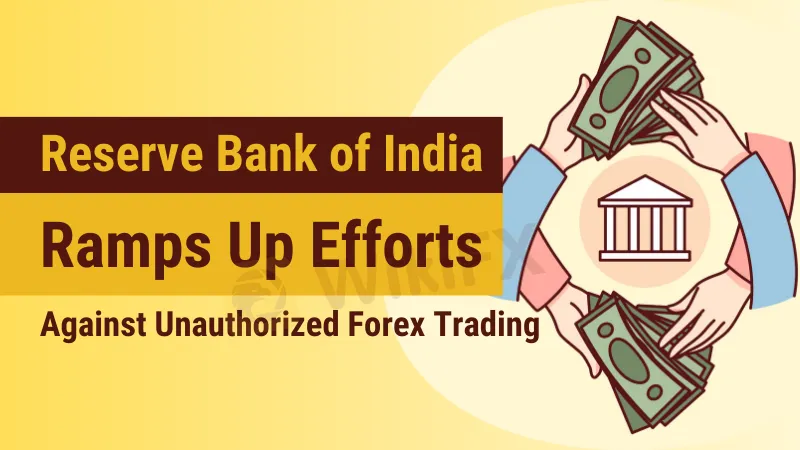简体中文
繁體中文
English
Pусский
日本語
ภาษาไทย
Tiếng Việt
Bahasa Indonesia
Español
हिन्दी
Filippiiniläinen
Français
Deutsch
Português
Türkçe
한국어
العربية
Reserve Bank of India Ramps Up Efforts Against Unauthorized Forex Trading
Abstract:RBI takes strict action against illegal forex trading, enhancing KYC norms and using technology for financial stability.

With the explicit intention of safeguarding India's financial stability, the Reserve Bank of India (RBI) has declared a succession of stringent protocols designed to suppress illicit foreign exchange trading. The Economic Times has documented a worrisome increase in unauthorized foreign exchange transactions, which has prompted the development of this strategic initiative.
Enhanced Cooperation and Strict Measures
The RBI is actively engaged in dialogues with a number of banks and government entities in an effort to devise and execute stringent measures that would efficiently deter the unauthorized use of banking channels for foreign exchange transactions. In light of the recent arrests associated with these unlawful activities, this decision underscores the central bank's dedication to preserving the credibility of India's financial systems.
Case Studies Heighten the RBI's Vigilance
Two merchants were apprehended by the Directorate of Enforcement earlier this year on suspicion of engaging in illicit foreign exchange trading. The individuals, situated in Kolkata, possessed an extraordinary 180 bank accounts, which resulted in the confiscation of Rs 120 crore. The proactive approach of the RBI is additionally demonstrated through the compilation of an alert list that includes seventy-five entities, such as unauthorized platforms and websites involved in illicit foreign exchange transactions.
Enhancing the Regulatory Structure
In an endeavor to enhance its regulatory framework, the Reserve Bank of India (RBI) has addressed a letter to stakeholders soliciting recommendations on how to combat illicit foreign exchange trading. In all foreign exchange (FX) transactions, the central bank stresses the critical significance of increased public awareness and stricter adherence to Know Your Customer (KYC) regulations.

Government and Technology Partnership
There have been proposals from bank administrators in both the public and private sectors to integrate supplementary technological controls. The objective of these recommendations is to augment the surveillance and supervision of foreign exchange transactions. The Joint Venture of the Reserve Bank of India (RBI) and the Ministry of Electronics and Information Technology (MeitY) aims to leverage technological progress in order to enhance the detection and prevention of illicit foreign exchange operations.
Legal Consequences and Public Education
Multiple advisories have been issued by the RBI, advising against conducting business with unauthorized platforms and entities and citing potential legal repercussions under the Foreign Exchange Management Act of 1999 (FEMA). Concurrently, the RBI is promoting the implementation of all-encompassing public education initiatives aimed at enlightening the populace regarding the hazards linked to unlicensed electronic trading platforms (ETPs).
Entities on the RBI's Radar
The Reserve Bank of India (RBI) has issued advisories in which it specifically names Alpari, AnyFX, Ava Trade, Binomo, eToro, Exness, Expert Option, FBS, FinFxPro, Forex.com, Forex4money, and Foxroex, urging the general public to exercise caution and diligence.
About the Reserve Bank of India
The Reserve Bank of India, which was founded in 1935, serves as India's highest monetary authority. The Reserve Bank of India (RBI), which is responsible for overseeing the nation's financial sector, is instrumental in developing and executing monetary policy. Furthermore, it exercises authority over the issuance of currency and administers the nation's foreign exchange reserves, thereby promoting growth and economic stability.

Disclaimer:
The views in this article only represent the author's personal views, and do not constitute investment advice on this platform. This platform does not guarantee the accuracy, completeness and timeliness of the information in the article, and will not be liable for any loss caused by the use of or reliance on the information in the article.
Related broker
Read more

Think Scams Won’t Happen to You? That’s Exactly What Scammers Count On
We live in a world where information is everywhere. People are more digitally literate than ever before. Financial education is just a few clicks away. And yet, investment scams are not going away but they’re getting worse. It’s tempting to think that only the gullible fall for these tricks. But that’s far from the truth. Why? Because investment scams don’t target your knowledge. They target your emotions.

Why Trade Agreements Matter to Nations
In today’s interconnected world, trade agreements serve as the foundation for stable and predictable international commerce.

Trade Fights Are Heating Up—What Happens Next?
Global financial markets have become increasingly reactive to even minor developments in international trade talks.

Juno Markets Upgrades to FYNXT PAMM
Juno Markets has successfully upgraded its managed account infrastructure by integrating FYNXT’s Percent Allocation Management Module (PAMM) system.
WikiFX Broker
Latest News
Five UK Financial Firms Collapse, FSCS Offers Support for Affected Clients
Why Trade Agreements Matter to Nations
Non-Existent Online Scheme Took Away RM580,000
RM15 Million Gone in Fake Investment Scam
Think Scams Won’t Happen to You? That’s Exactly What Scammers Count On
Crypto Traders Hit by Scam Using Fake Regulatory Documents, MFSA Cautions
Trade Fights Are Heating Up—What Happens Next?
Juno Markets Upgrades to FYNXT PAMM
Beware of New Scam Tactics Lurking on WhatsApp!!
Italy’s CONSOB Blocks Sites of ITradingFX and NEX TRADE in Latest Crackdown
Currency Calculator


